For the 3rd annual Perpedes grant program, the foundation recieved a total of 79 nominations. The selection process took place in two rounds, resulting in the selection of 9 projects for grant support. The Foundation will support the selected associations, initiatives or individuals with a total sum of 630,000 CZK, each project receiving 70,000 CZK.
During the selection process the committee placed emphasis on interdisciplinary artistic collaborations that include an educational element which have the potential to produce a positive effect on their local communities.
The following projects were selected for Foundation support:
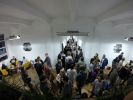
The 3. Etáž (3rd Floor) is a unique cultural space opened in the renovated interior of the former Brill factory, dating back to the 1930s. In 2014, architects from the Henkai studio started renovating it and created a plan for rejuvenating the large production hall, located in the former hosiery plant. Under the leadership of Daniel Bartoš, they have been operating and developing the platform for effective cooperation among the tenants of the industrial compound, who devote their free time to organizing the artistic and educational programs of the shared gallery. For the inhabitants of the small Moravian town of Rožnov, the 3. Etáž has become a unique place on an otherwise rather sparse cultural map. During its five years of operation, this creative and productive unit, which largely runs DIY, has staged countless exhibitions, lectures, musical performances and debates with invited guests. They also collaborate on organizing the experimental concert cycle Hudební fujaré.
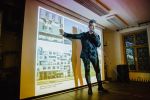
Since October 2014, the diverse cultural space with the mildly provocative name PRAHA has been run by the Brno-based association 4AM Forum for Architecture and Media in collaboration with the Moravian Gallery in Brno. Offering a unique dramaturgy based around principles of openness, accessibility, creative mobility and freedom of expression, 4 AM have drawn in a wide community of affiliated artists, theoreticians, audiences and supporters. Through discussions, international workshops, lectures, exhibitions and events in the public space, the collective formulates and critically explores current social questions and problems related to architecture, urbanism, the city space, contemporary art and new media.
PRAHA is a non-smoking café and bar with a public library containing expert publications and periodicals on contemporary architecture, design and art. As a lecture and exhibition space, it has become a hub for discussions and theory, artistic interventions, workshops, happenings, audiovisual projects and symposia. The space also organizes concerts of electronic, improvised and contemporary classical music, as well as original and experimental theater. The 4AM platform has produced numerous projects which have become an important part of the cultural scene in Brno and have also had international impact.
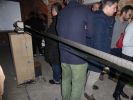
The Argentum Vivum creative platform was founded in 2008 by a collective of artists headed by experimental filmmaker Martin Ježek. Its objective is to support and build a community for creating independent audio-visual works exclusively using the classical photochemical methods. Currently, they are building a fully equipped film laboratory which would facilitate the contact of visual artists with the processing of analogue film material. A central motive of this original initiative is to keep the memory of, and spread awareness of working with film material, as well as developing a shared community experience. An additional aim is also to dispel the myth that film material is expensive or not readily available. The platform organizes initiatory workshops for students of art schools where the fundamentals are covered, as well as the creative potential of the photochemical process. The group has also managed to develop its own film emulsion which allows one to work with the photochemical process without having to make use of commercially distributed products.

The Gallery of St. Havel was founded in 2017 by the parish community of the Evangelical Church of Czech Brethren with the intent to create an independent cultural space and to expand the local cultural production in a city which is otherwise dominated by the automobile industry.
The program dramaturgy is mostly done through the volunteer work of local priest Jonatan Hudec, academic painter Martin Herold and promoter Jiří Dalecký, whose efforts are aided by many other volunteers. The gallery’s program opens up space for the meeting of people from various social classes. The community also organizes the multi-genre festival Havloděj, a fair-trade market, lectures focused on contemporary social themes, as well as film screenings of the Mental Power festival.
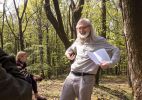
Art historian, curator, publicist and cultural activist Jiří Zemánek (b. 1953) is a uniquely important person on the Czech art scene, having inspired artists, curators and other cultural actors of all generations. He focuses on Czech modern and contemporary art, especially sculpture, action and earth art, the history of kineticism and new media art. He is also interested in the connections of artistic practice with ecology and spirituality, as well as the question of paradigm shifts and the concept of integral culture. In his art, Jiří Zemánek works in a much broader context than is usually accommodated in the field of “art history.” He has long promoted the forgotten fact that art has the ability to heal, to shape our mind and frame a story.
In his multi-tiered body of work, Zemánek connects art, spirituality, culture and environmental themes. He brings the thoughts of European and American eco-philosophers and cosmologists, who seek possible solutions to the global crisis into the central European context. The core of Zemánek’s new perspective is a vision of the mutually-interrelated, multi-dimensional “living world” which comprises nature (that part of the world not created by human artifice), not only as a component, but rather as the very source of our culture and our humanity. Jiří Zemánek has prepared two books by American eco-philosopher David Abram for publication, and has founded two civic associations, which include PILGRIM, and the Czech section of the Budapest Club. He closely collaborates with a number of international associations and individuals of a similar focus, such as The Alliance for Wild Ethics of American philosopher and ecologist David Abram, Europäischen Akademie der Heilenden Künste of Johannes Heimrath and American astronomer and psychotherapist Stephan Martin.
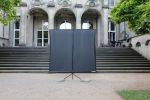
The eastern Bohemian Luxfer Gallery was founded in March 2010, and focuses on the local presentation of contemporary art. It thus aims to help decentralize the Czech art scene. The experimental platform gives contemporary artists opportunities to experiment and do research, and thus plays an important role in the communication between the center and the region.
The association organizes exhibitions of contemporary art and educational activities which aim to improve public awareness of contemporary art. They organize art residencies, symposia and run studios. The collective of organizers and curators collaborates on similar projects, both in the Czech Republic and abroad, and since its founding has organized almost 30 stand-alone exhibitions which included major Czech artists as well as local artists from the region.
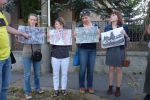
The east Bohemian association Promejto was founded in 2014. Its activities aim to draw local people into a discussion about the creation and protection of a beneficial urban environment. They organize guided tours through the city, discussions on art in the public space and seminars about the meaning and potential of the city’s conceptual development, to which they invite the representatives of the contemporary art scene as well as the city authorities. They also cultivate natural communal relationships through local neighborhood festivals, during which the streets are filled with art, artistic workshops, literary readings and all sorts of diverse events. The initiative’s program is always predicated on a progressive approach and on forms of working with the general public and with the community.
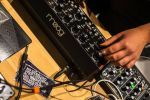
Synth Library is a Prague-based independent initiative with international ambitions, led by musician, curator, music publicist and activist Marie Čtveráčková, alias Mary C. The synthesizer library has been active in Prague since 2018, and is the first library of its kind modeled on the original American S1 Synth Library in Portland (Oregon, US), founded by Alissa DeRubeis. It is a space for experimentation, sound art, composition, and theory. The library is run on a strictly not-for-profit basis, and cultivates a communal atmosphere with a strong educational focus catering to children, adults, as well as the expert and general public. The courses focus not only on the creation of electronic music, but also on the promotion of bringing otherwise forgotten music technologies to light. The organizers link their library to an international network of residency and exchange programs, and they also participate as pedagogues, as for example at the Superbooth festival in Berlin. Mary C. and Martin Tvrdý’s traveling recording studio hosts workshops in excluded localities, social centers and orphanages. In organizing their course, they also collaborate with Aeroškola, a project for audiovisual education.

The association Za Opavu (For Opava) is a long-standing project which has built itself a profile as a general organizing force behind Silesia’s local cultural and social scene. The main goal of the association is to protect the cultural heritage, natural environment and healthy living conditions of the city of Opava and environs. The association systematically maps and protects the region’s threatened historical sites, and has also published the Children’s Guide to Historical Sites. Members of the the association actively figure as the cultural political opposition to municipal authorities, offering their commentary on how culture is conceptualized in Opava, as well as on the city planning projects.
Since 2007, Za Opavu has bestowed the J.M. Olbrich Award for high-quality architectural projects, and has also worked to evaluate the region’s renovation and construction works. Every year, they organize the Opavské noční kupé (Opava Night Train) which is a variation on the worldwide Pecha Kucha Night gatherings. The society’s members collaborate with the region’s important artistic and cultural initiatives (such as Bludný Kámen, a 2017 Perpedes laureate). The focus of Za Opavu’s program also includes various activities such as film screenings, urban camps and children’s education, administration, and a community garden educational program.